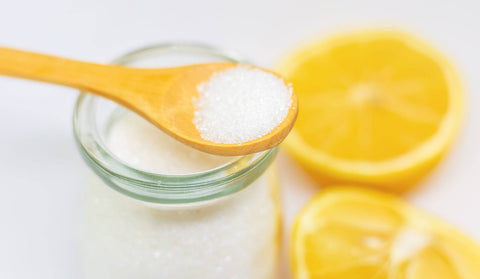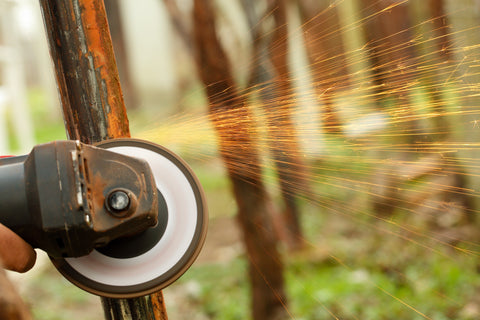How To Remove Rust From Metal: 11 Different Methods

Jump to:
Rust is not only unsightly but can cause your tools to stop functioning or at least function less well. It also can be a pain to remove. If you are sufficiently wealthy to just throw away your rusted tools and buy some more, then no problem! Unfortunately, however, most of us do not have this luxury.
In this article, we shall look at how to remove rust from metal. We shall start with some household remedies before looking at some things you might like to purchase to help you get the job done if more assistance is required.
Homemade Remedies For Removing Rust

Before turning to commercial solutions for removing rust, you might like to try some homemade remedies, most of which involve things that you would normally find lying around the house.
Baking Soda
This works in case of less severe rust, such as on thin metals, as well as light rust rings. Rinse the metal and shake it dry. Dust the rusty areas with the baking soda and after leaving for an hour, scour with a steel wool or metal brush using as much force as possible. Then rinse and dry.
Vinegar
If your tools are significantly rusty, and you are able to submerge them without affecting any of the other surfaces, a vinegar bath can be a good way to remove the rust. Submerge your rusty implement in white vinegar and leave overnight. Then, as in the case of baking soda, scour using steel wool or a metal brush. If you are unable to submerge the item, wrap the rusted area in rags soaked in vinegar.
Potatoes
Raw white potatoes contain oxalic acid, and this makes them an effective natural rust remover when combined with a gentle abrasive, such as salt or the previously-mentioned baking soda.
Simply slice the potato in half and sprinkle salt or baking soda onto the cut side of the potato. Then rub the cut side on the rusted area. If you don’t have baking soda, dish soap should work just as well.
If you have rusty knives, you can sometimes remove the rust well by plunging the knife into a potato and leaving it there for a few hours. We wouldn’t recommend eating the potato afterward though.
Lemon Juice Paste
For stubborn rust, citric acid may be the way to go. Make a paste using two parts baking soda and one part lemon juice, and then apply the paste to the rusty area using a sponge and allow to sit for at least 30 minutes. Use a brush or steel wool to scrub away the rust from the metal.
Onions
The lowly onion can also be a very useful ally when it comes to removing rust from metal. Onions contain amino acid sulfoxides that form sulfenic acid when exposed to oxygen. This sulfenic acid works to break down the rust. Cut a piece off the onion and scrub the rusted area with the onion.
If the metal object you are trying to remove the rust from is a stainless-steel knife, then simply running the knife through an onion is likely to be effective in removing the rust.
Diesel
It is also possible to remove rust from metal using diesel. Take a liter of diesel, pour it into a can, and soak rusty tools in the can of diesel for a day. Remove the tool and then scrub with a brush or steel wool.
Coca-Cola
If you don’t have any of the above at home, but you have some Coca-Cola, which contains phosphoric acid, this can work. It can be used to remove rust from many objects, although as the amount of phosphoric acid it contains is quite low, this can take some time. There is also the disadvantage that the tool or metal you are working on will get very sticky, so it will need to be washed well afterward.
The above methods should be sufficient for most types of rust, but if you are still unable to remove the rust, it may be necessary to move on to some shop-bought solutions.
Products For Removing Rust

Although effective in many cases, the household solutions previously mentioned usually involve soaking and leaving the rusted area for some time before the rust can be removed. If you are in a real hurry, some store-bought options may be able to get the job done quicker.
Engineer Rust Remover ZC-28
This liquid-type rust remover, made by ENGINEER Inc., is both powerful and quick-acting. In the discussion of chemical removers, it was noted that they can be harmful to the skin, but the manufacturer claims that as this is a neutral liquid, it is less harmful when it comes into contact with the skin.
Although primarily designed for removing the rust from screws, this can be applied to any kind of metal rust. For better performance, it is recommended that the liquid is gently heated (but do not overheat.)
Chemical Remover
Chemical removers work to dissolve the rust using phosphoric or oxalic acid solutions. These may be at a high enough concentration that they can be harmful to the skin, so it is necessary to take precautions in advance, such as wearing gloves. It should be noted, however, that aggressive solutions such as these should not be used on delicate surfaces or appliances as they may cause damage.
Rust Converters
Instead of removing rust, the converter reacts with the rust that is there and prevents any more rust from forming. It resembles the action of spray paint, used as a primer for paint coats. As it does not remove the rust but just prevents more from forming, rust converters are a good choice if you plan to paint your metal tools or parts after removing the rust.
Powder Cleansers
Powder cleansers, like “Bar Keepers Friend”, are gentle enough not to damage surfaces, but tough enough to cut through areas that are significantly rusted. When sprinkled on wet surfaces, the oxalic acid in the cleanser works to break up the stain. In case of highly stubborn rust, larger amounts of water and cleanser should be added to make a paste.
You can choose the spray setting for spot areas of rust, or the foam setting to cover a wider area.
Citric Acid Powders
This works similarly to the lemons covered under homemade remedies, but it is easier to provide a more concentrated solution. Buy a small box of citric acid powder at your local supermarket, pour some of the acid powder into a plastic container, and add just enough hot water to cover the metal tool or part to remove rust. Dip the part or tool into the mixture. Leave the tool or part there overnight and rinse it with water in the morning to remove rust from the metal.
Just Add Elbow Grease

As we have covered in this post, there are a multitude of different ways of tackling rust in metal and the option you will choose will depend on a number of factors, such as how much time you have, how significant the rusted portion is, and what you happen to have to hand. As the different methods are merely different ways of breaking down the rust, you will still need to be prepared to add a little elbow grease when using the metal brush or steel wool to completely remove the rust.
What have you found to be the most successful means of getting rid of rust? Do you know of any ways of doing this other than those mentioned in this post? Let us know in the comments.

2 comments
Hi Ruby, thanks for the comment. I believe using a light oil and a moderately abrasive steel brush would be the best option in the case of a firearm. You’d need to go at it gently, and likely take multiple passes before the rust is removed.
Regards,
Daitool.
Daitool,
What is a safe way to get rust off a pistol and not ruin it. It’s not to much rust. But I need help please and Thank you.
Ruby ,